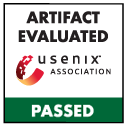Ryan Lehmkuhl and Pratyush Mishra, UC Berkeley; Akshayaram Srinivasan, Tata Institute of Fundamental Research; Raluca Ada Popa, UC Berkeley
The increasing adoption of machine learning inference in applications has led to a corresponding increase in concerns about the privacy guarantees offered by existing mechanisms for inference. Such concerns have motivated the construction of efficient secure inference protocols that allow parties to perform inference without revealing their sensitive information. Recently, there has been a proliferation of such proposals, rapidly improving efficiency. However, most of these protocols assume that the client is semi-honest, that is, the client does not deviate from the protocol; yet in practice, clients are many, have varying incentives, and can behave arbitrarily.
To demonstrate that a malicious client can completely break the security of semi-honest protocols, we first develop a new model-extraction attack against many state-of-the-art secure inference protocols. Our attack enables a malicious client to learn model weights with 22x--312x fewer queries than the best black-box model-extraction attack and scales to much deeper networks.
Motivated by the severity of our attack, we design and implement MUSE, an efficient two-party secure inference protocol resilient to malicious clients. MUSE introduces a novel cryptographic protocol for conditional disclosure of secrets to switch between authenticated additive secret shares and garbled circuit labels, and an improved Beaver's triple generation procedure which is 8x--12.5x faster than existing techniques.
These protocols allow MUSE to push a majority of its cryptographic overhead into a preprocessing phase: compared to the equivalent semi-honest protocol (which is close to state-of-the-art), MUSE's online phase is only 1.7x--2.2x slower and uses 1.4x more communication. Overall, MUSE is 13.4x--21x faster and uses 2x--3.6x less communication than existing secure inference protocols which defend against malicious clients.
Open Access Media
USENIX is committed to Open Access to the research presented at our events. Papers and proceedings are freely available to everyone once the event begins. Any video, audio, and/or slides that are posted after the event are also free and open to everyone. Support USENIX and our commitment to Open Access.
author = {Ryan Lehmkuhl and Pratyush Mishra and Akshayaram Srinivasan and Raluca Ada Popa},
title = {Muse: Secure Inference Resilient to Malicious Clients},
booktitle = {30th USENIX Security Symposium (USENIX Security 21)},
year = {2021},
isbn = {978-1-939133-24-3},
pages = {2201--2218},
url = {https://www.usenix.org/conference/usenixsecurity21/presentation/lehmkuhl},
publisher = {USENIX Association},
month = aug
}

